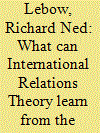| Srl | Item |
| 1 |
ID:
137093


|
|
|
|
|
| Summary/Abstract |
This article argues that in the wake of 9/11, Pakistan engaged in two policy moves that were highly problematic and controversial from a domestic perspective: the alliance with the United States, and the simultaneous disengagement with the Taliban regime. While realist accounts largely posit these moves as a consequence of US diktat, this article is more interested in exploring how the actions were enabled by a domestic political narrative. Scholarly accounts in the post 9/11 era tend to marginalise the role of indigenous agency and ‘voice’, and overwhelmingly work within frameworks that emphasise the consequential effects of US hegemony. Conversely, in examining official Pakistani political discourses, the article argues that a number of identifiable rhetorical strategies played a performative role in enabling specific Pakistani policy outcomes in the wake of 9/11. In important ways, the analysis moves away from unproblematically assuming Pakistan as simply a passive recipient of American ‘empire’.
|
|
|
|
|
|
|
|
|
|
|
|
|
|
|
|
| 2 |
ID:
137092


|
|
|
|
|
| Summary/Abstract |
World War I is a foundational or critical case for theories of international relations that address the causes of war. They include balance of power, deterrence, power transition theory, and rationalist models of decision making. Recent historical work on the underlying and immediate causes of World War I raises serious problems for all these approaches. Among other things, they highlight the importance of context, how it is understood by leaders, their motives and assumptions, and their tendency to exaggerate the constraints acting on them, the freedom of other actors, and their ability to predict events and control risks.
|
|
|
|
|
|
|
|
|
|
|
|
|
|
|
|
| 3 |
ID:
137094


|
|
|
|
|
| Summary/Abstract |
Paragraph 139 of the World Summit Outcome Document (WSOD) stipulates that the international community is prepared to respond on a ‘case-by-case basis’ in a ‘timely and decisive manner’ when ‘national authorities are manifestly failing to protect their populations’ from genocide, war crimes, ethnic cleansing and crimes against humanity. But what constitutes a ‘manifest failing’? Ten years on from the WSOD, it is evident that there is a large amount of ambiguity and inconsistency in how this term is interpreted and applied. This article highlights the confusion and complexity within the discourse prior to putting forward five policy prescriptions. In so doing, it argues that a more informed understanding of the concept will, primarily, rectify the problems of ambiguity and inconsistency and, secondarily, may help address fears of Great Power manipulation and assist in delegitimising misuse of the R2P.
|
|
|
|
|
|
|
|
|
|
|
|
|
|
|
|